ENGLAND
Birmingham

Birmingham
Birmingham
Birmingham is a city and district in the West Midlands County of England, and it is the most populous British city after London. According to the 2009 census, the population is 1,028,701. The Birmingham metropolitan area is home to 3,683,000 people. Today Birmingham is a major international world city with many facilities in the field of trade, transport, entertainment.
 BirminghamPhoto: JimmyGuano CC 4.0 International no changes made
BirminghamPhoto: JimmyGuano CC 4.0 International no changes made
With three universities and two colleges, Birmingham is one of the most important centers of higher education in the United Kingdom. In the last twenty years, Birmingham has been ranked in the top 20 most livable cities in the world.
| advertisement |
| HotelsBirmingham |
Location
Birmingham is located in the center of the West Midlands of England on the Birmingham Plateau, 150 to 300m above sea level. Together with the cities of Solihull and Wolverhampton, Birmingham is part of the West Midlands Urban Area, which extends over 600 km2.
Weather
Birmingham has a moderate maritime climate, with an average maximum temperature in summer (July) of 20 °C. In winter (January), the temperature is around 4.5 °C. Extreme weather conditions are rare, but sometimes it storms in the summer. In winter it snow regularly because of its location in the interior and the relatively high height above sea level.
History
Artifacts over 10,400 years old have been found near Curzon Street in central Birmingham. They provide proof that people already lived on the site of what is now Birmingham.
In the early 7th century, Birmingham was an Anglo-Saxon farming village on the banks of the Rea River. It is widely believed that the name 'Birmingham' is descended from 'Beorma Inga ham', which means something like descendants of Beorma.
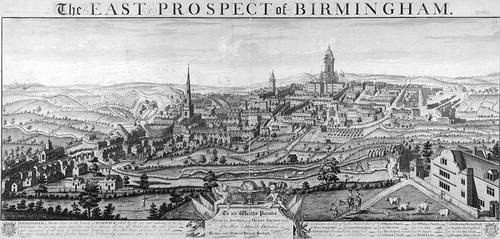 Birmingham around 1732Photo: Public Domain
Birmingham around 1732Photo: Public Domain
In 1166, Birmingham was transformed from a village into a market town by Peter of Birmingham, who had been granted permission by the king to run a market in his castle. The supply of iron ore and coal led to the metalworking industry in the 16th century. In the 17th century, Birmingham developed into an important city and produced small arms. In the 18th century, local humanists and industrialists formed the famous Lunar Society, which aimed to improve the quality of life in the city.
During the Industrial Revolution, Birmingham became a prosperous city and quickly grew into an important industrial center. The city was at the forefront of global developments in science, technology and economy. Innovations laid the foundations of modern industrial society. The city had thousands of small workshops specializing in high-quality crafts and achieved an exceptional level of creativity and innovation. During the Victorian era, the population of Birmingham grew rapidly to over half a million and Birmingham became England's second city. Birmingham was granted city status in 1889 by Queen Victoria.
Birmingham suffered heavy bomb damage during World War II. Lately, the construction of new squares and the Millennium Place have changed Birmingham's cityscape. Streets, buildings and canals have been restored.
Sights
Because Birmingham mainly developed during the Industrial Revolution, relatively few buildings from earlier history have been preserved. There are 1946 protected buildings in Birmingham and 13 old monuments.
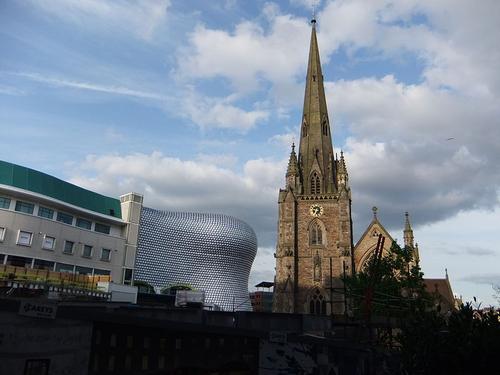 St Martin in BirminghamPhoto: Public domain
St Martin in BirminghamPhoto: Public domain
Traces of medieval Birmingham can be seen in one of the city's oldest churches, the original parish church of St. Martin in the Bull Ring. A number of buildings from the Medieval and Tudor periods have also been preserved, such as the Lad in the Lane and The Old Crown, the 15th-century pub Saracen's Head and the Old Grammar School in Kings Norton.
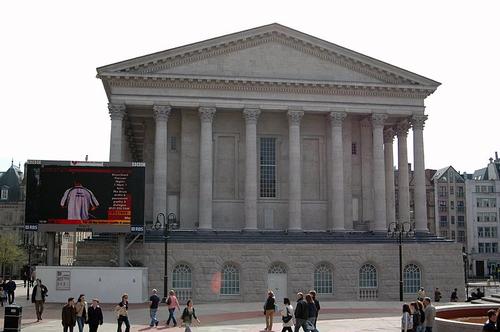 Birmingham Town hallPhoto: Very Quiet CC 2.0 Unported no changes made
Birmingham Town hallPhoto: Very Quiet CC 2.0 Unported no changes made
Buildings from the Georgian period include St. Philip's, Soho House, Perrott's Folly, City Hall and St Paul's Square. The Victorian Justice Palace, the Town Hall and the Museum & Art Gallery date from the Victorian era. St. Chad's Cathedral is the first Roman Catholic cathedral in the United Kingdom since the Reformation. In recent years, the city has been changing with the construction of many new modern buildings.
Museums and galleries
When you visit this special city there are many museums to choose from. Below are some of the most important:
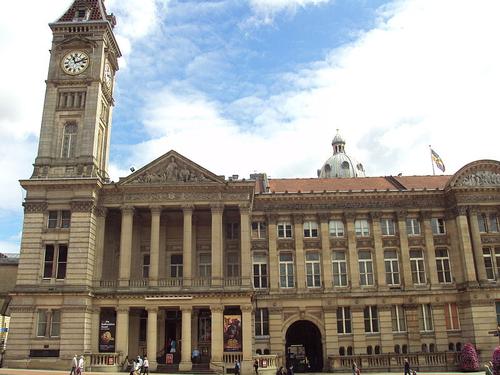 Birmingham Museum and Art GalleryPhoto: Rept0n1x CC 3.0 Unported no changes made
Birmingham Museum and Art GalleryPhoto: Rept0n1x CC 3.0 Unported no changes made
Birmingham Museum & Art Gallery is best known for its excellent collection of Pre-Raphaelite painters. There are also old masters, including important works by Bellini, Rubens, Canaletto and Claude Monet. There is also a rich collection of seventeenth century Italian Baroque painting.
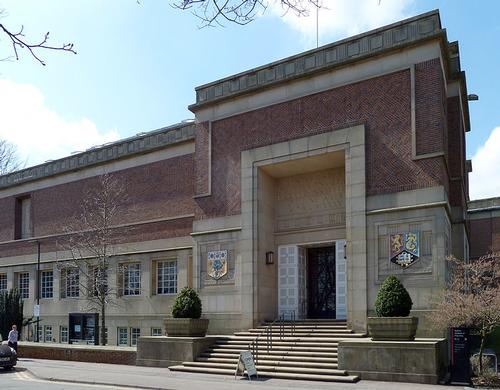 Barber Institute of Fine ArtPhoto: Public Domain
Barber Institute of Fine ArtPhoto: Public Domain
The Barber Institute of Fine Arts in Edgbaston, is one of the most beautiful small art galleries in the world, displaying a collection of exceptional quality representing Western art from the thirteenth century to the present.
Think Tank is Birmingham's premier science museum with a planetarium and one of the world's oldest operating steam engines. Other science museums include the National Sea Life Center, the Museum of Geology at the University of Birmingham and the Earth Center in Winston Green.
You can also visit Aston Hall, Blakesley Hall, the Museum of the Jewelry District, Soho House, and Sarehole Mill, a popular attraction for fans of JRR Tolkien.
Tips
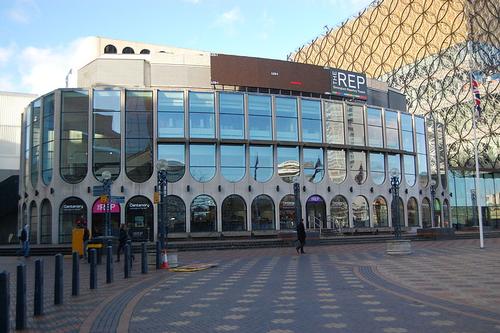 Birmingham Repertory TheatrePhoto Andy Mabbett CC 3.0 Unported no changes made
Birmingham Repertory TheatrePhoto Andy Mabbett CC 3.0 Unported no changes made
Birmingham is known for its nightlife and diverse entertainment. Nightlife in Birmingham is mainly concentrated along Broad Street. There are lively bars and cafes in Gas Street Basin. The Birmingham Repertory Theater in Centenary Square brings culture and entertainment to everyone in the West Midlands. New plays are often shown here. A number of interesting festivals are held in the city every year. The Birmingham Comedy Festival has focused on the city's vibrant comedy scene since 2001. Since then, the festival has grown into one of the largest independent arts festivals in England.
Useful links Birmingham
BBC Country ProfilesWorld Fact Book Explore all Countries
How to call
Last updated June 2025
Copyright: Team - The World of Info